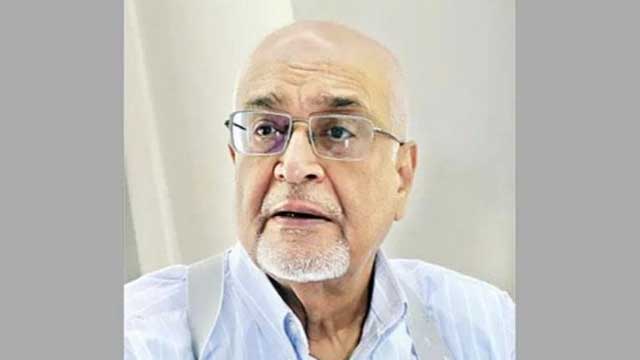Bangladesh’s three big challenges in the fields of economy, international relations, and politics are likely to get deeper centering the January 7 parliamentary elections, Dr. Debapriya Bhattacharya, distinguished fellow of Centre for Policy Dialogue has said.
“Bangladesh today stands on the edge of a deep ditch,” he said adding that the problems faced by the country are likely to worsen if the upcoming polls become one-sided.
The eminent economist shared his views on a wide range of issues from ongoing political unrest to economic situation and to international interest in an interview with UNB in Dhaka this week.
Political unrest and a one-party election will deepen the uncertainty in the economic sector further as around 80 percent population of Bangladesh wants a fair and internationally acceptable election that is very much needed for sustainable economic growth, Dr Debapriya said.
Regarding elections without the participation of big political parties, he said the Election Commission is creating political parties giving registration as per their wish.
The country is now getting the attention of global powers as they have different interests here. They are watching whether the upcoming election will be like previous ones or inclusive and participatory.
Regarding economic challenges, he said people have been bearing the brunt of inflation for a long time, while many countries have improved in this sector after the pandemic and during the Russia-Ukraine war.
Here the food inflation is around 12 percent and inflation in rural areas is more than in the urban areas, which was not seen earlier, he noted.
According to him due to the continuous slide of the domestic currency taka, people have to face imported inflation.
There is no visible sign of reducing this type of inflation in the recent months, Dr Debapriya said.
He said the revenue generation fell severely due to an import decrease by one-fourth in recent past years. He said the inefficiency of the revenue board has resulted in low collection of revenue.
The government cannot implement already promised development work at the local government level, even in the election year, he mentioned.
This stagnation will not go until an inclusive and free fair parliamentary election, which is necessary to establish accountability in every sector- is held, he said.
He said the drastic fall of imports pushed price hikes in the domestic market and a group of syndicates using this as an option for raising prices.
The revenue shortfall is widening, corruption and money laundering not reducing despite raising individual and overall income, which is happening due to lack of accountability. The government cannot ensure accountability at the top to bottom level as they are dependent on bureaucrats and state agencies in absence of political and moral legality, he pointed out.
Not only that but also some influential countries are interfering in the domestic matter of Bangladesh, which never happened earlier. All of these are the outcome of faulty elections here and they (foreigners) are taking political disagreement and lack of moral legality of the government as an opportunity, he opined.
Regarding the legitimacy of past elections Dr Debapriya said those elections had been legal in consideration of the constitution, but there was a lack of political and moral legality, he said.
A country becomes stronger when its independent state organs are strengthened, he said adding in Bangladesh both the constitutional institutions and other state agencies are playing a biased role.
Regarding labour rights, Dr Debapriya said the Western world expresses concern over the working environment, illegal harassment, and forced disappearance of labour rights activists. Western people, who are the buyers of Bangladeshi garments and other goods, are very much conscious and concerned about these issues.
Bangladesh has to reform many areas, such as recovery of huge defaulted loans, reduce money laundering, ensure decent working environment and express their views without fear, he said.
In the diplomatic sector, the country has to balance with global power keeping in mind that export destination of Bangladeshi goods, manpower, and remittances.





